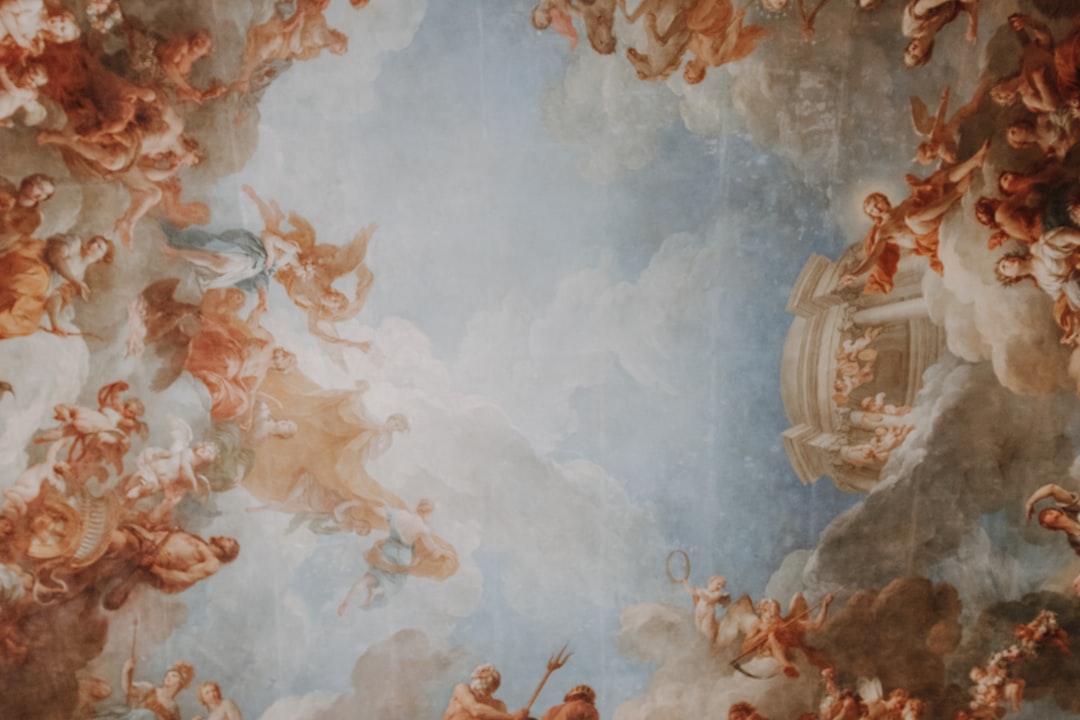The concept of God has captivated human imagination for centuries, and in modern times, the discovery of the vastness of the universe has only added to the wonder and awe surrounding this enigmatic entity. In this blog post, we delve deeper into the infinity of the cosmos and explore how it relates to the idea of God. Join us in our quest to unravel cosmic mysteries and gain a new understanding of the interconnection of all things that exist beyond human perception. Read on to expand your knowledge and ponder the monumental mysteries of the universe.
The Concept of God and Its Place in Human Perception

As humans, our understanding and perception of God is shaped by our experiences and beliefs. Depending on one’s culture, religion, and personal experiences, the concept of God can vary greatly. Some see God as an omnipotent and benevolent higher power, while others view God as a mysterious force beyond comprehension. When we try to understand the vastness of the universe and the mysteries of existence, it’s natural for our minds to turn to the idea of God.
Here are 3 ways to explore the concept of God and its place in human perception:
-
Consider the Scale of the Universe
The physical laws that govern the universe are vast and complex. From the tiniest subatomic particles to the largest superclusters of galaxies, the universe operates on a scale that is difficult for the human mind to comprehend. When we consider the scale of the universe, it’s natural to wonder about the existence of a higher power that created and governs it all. -
Reflect on Your Spiritual Beliefs and Experiences
For many people, their understanding of God is shaped by their spiritual beliefs and experiences. Whether it’s through prayer, meditation, or worship, people often feel a connection to something greater than themselves. Some see this connection as evidence of the existence of God, while others view it as a purely subjective experience. -
Study the Teachings of Philosophy and Theology
Throughout history, philosophers and theologians have explored the concept of God and our understanding of it. From ancient Greek thinkers to modern Christian theologians, there are many different perspectives and ideas about the nature of God. By studying these teachings, you can gain a deeper understanding of the complexity of the idea of God.

Exploring the concept of God and its place in human perception is a journey that can lead to a greater understanding of ourselves and the world around us. By considering the scale of the universe, reflecting on your spiritual beliefs and experiences, and studying the teachings of philosophy and theology, you can deepen your understanding of the mysteries of existence.
The Vastness of the Universe and Our Understanding of It
It’s hard to fathom just how vast the universe is. With countless galaxies, stars, and planets all spread out across unfathomable distances, it’s easy to feel small and insignificant. But how does our perception of the universe relate to our understanding of God?
As we continue to explore the mysteries of the cosmos, it’s important to remember that our human perception is limited. We are bound by the physical laws of space and time, and our experience of reality is filtered through our own unique perspective. It’s humbling to consider just how small we are in comparison to the vast expanse of the universe, and yet this same universe was created by a higher power.
From a spiritual perspective, the vastness of the universe can serve as a reminder of the infinite wisdom of God. It’s easy to get caught up in our own day-to-day problems and lose sight of the bigger picture. But when we take a step back and consider the immensity of creation, we’re reminded that there exists a higher power with an omnipresent understanding of all things.
The sheer magnitude of the universe is a testament to the benevolence of God; in creating such a complex and infinitely diverse cosmos, we’re reminded of the infinite generosity and creativity of the divine. We may not understand all the mysteries of the universe, but we can rest assured that there is purpose and intention behind it all.
It’s important to recognize, however, that our perception of God is shaped by our understanding of the universe. Our limited human perspective can only grasp so much of the cosmic mysteries beyond our reach. As we continue to explore and discover the vastness of creation, we must also remember the presence of the divine in all things and seek to connect with the higher power that created it all.
In the end, the vastness of the universe is a humbling reminder of our place in the grand scheme of things. But through our belief and understanding, we can navigate the mysteries and wonders of creation and connect with the divine that is present in all things.
The Idea of Infinity and How It Relates to God
Have you ever tried to wrap your head around the concept of infinity? It’s a mind-bending idea that can leave you feeling both awestruck and totally bewildered. The universe itself is infinite in size, with new galaxies constantly being discovered. But what about God? How does the idea of infinity relate to our understanding of a higher power?
Here are a few key points to consider:
- The concept of infinity goes beyond our understanding of space and time, which are limited by physical laws. God, as an omnipotent and benevolent being, is not constrained by such limitations.
- Philosophers and theologians throughout history have explored the idea of an infinite divine presence, which exists beyond the material world we can see and touch.
- Some believe that the infinite wisdom and power of God are manifested in the vastness of the universe itself. Whether or not you view the universe as evidence of a higher power, its sheer magnitude can inspire a sense of awe and wonder.
- In Christian theology, God is often described as omnipresent, existing in all dimensions and times simultaneously. This idea of a timeless, omnipresent deity is closely linked to the concept of infinity.

So, how can we try to understand the infinite when it comes to God? One way is to recognize the limitations of our human perception. Our experience of reality is limited by our physical senses and the constraints of our minds. We can only comprehend a small fraction of the universe’s mysteries, let alone the nature of a divine being.
However, this doesn’t mean that we can’t explore the spiritual dimensions of existence and deepen our understanding of God. Through prayer, meditation, and contemplation, we can tap into a higher awareness and connect with the divine. We can also draw on the wisdom of religious texts and the insights of spiritual leaders to deepen our understanding of God’s infinite nature.
Ultimately, coming to a clear understanding of the infinite nature of God is beyond the scope of our human abilities. We can only approach it with humility, wonder, and a willingness to explore the mysteries of the universe and our place in it.
Exploring the Cosmic Mysteries Beyond Our Reach
As humans, we tend to think we understand everything around us. We have laws of physics, mathematics, and science that explain the world around us. However, when we turn our attention to the cosmos, we find that our understanding is limited. There are still many mysteries beyond our comprehension, and this includes the concept of God.
The universe is vast and almost beyond comprehension. It’s difficult to wrap our heads around the sheer magnitude of it all. The universe is estimated to have a diameter of around 93 billion light-years – a distance impossible to understand with our limited frame of reference.
But it’s not just the size that astounds us—the universe is full of cosmic mysteries that are beyond our reach. How did it all come to be? Why do we exist? What is the purpose of it all? These are all questions that science cannot answer, and that is where spirituality comes in.
« Unveiling the Mystery: Understanding Why God Chose You
Discovering the Power and Purpose of Prayer »
Understanding the infinite nature of the universe is essential in comprehending the concept of God. An omnipotent, omniscient, and omnipresent God suggests a higher power with infinite wisdom and benevolence. It’s easy to dismiss the idea of God based on our limited perception of reality, but there is so much more beyond what we can see.
The physical laws of space and time seem to break down when we turn our attention to the universe’s mysteries. However, instead of undermining the idea of God, it reinforces it. The universe’s infinite nature points to a higher power beyond our comprehension, beyond our physical limitations.
For many, the perception of God is a personal experience that is beyond the physical world. It’s a perception of something much greater than ourselves. When we look at the universe’s mysteries, it is easy to understand why people turn to religion and spirituality to find answers.
Exploring the cosmic mysteries beyond our reach is an essential part of understanding God’s place in our lives. While we may never be able to answer all of the questions surrounding the creation and existence of the universe, it’s comforting to know that there is something greater beyond our comprehension.

The Interconnection of All Things and the Presence of the Divine
Have you ever stopped to consider the intricate interconnectedness of the universe? From the tiniest particles to the largest galaxies, everything is connected in a vast and complex web of existence. And at the heart of it all, many believe, is the presence of the divine.
It’s a humbling thought to consider our place in the universe and the larger tapestry of creation. As humans, we often feel small and insignificant in the face of such vastness, but the truth is that we are an integral part of the whole. Each of us is a unique expression of the divine, playing a vital role in the interconnectedness of all things.
This idea of interconnectedness is not just spiritual or philosophical; it’s also backed by science. Physicists have discovered that particles can be entangled with one another, meaning that the state of one particle can affect the state of another, even if they are separated by vast distances. This points to a deep connection between all things, even on the most fundamental level.
As we contemplate this interconnection and the presence of the divine within it, we begin to see the world in a new way. We start to recognize that our actions have ripple effects that extend far beyond what we can see. We also realize that we are not alone in this world but are part of a vast network of beings, both seen and unseen, that are all working together to bring about the greater good.

So how can we tap into this interconnection and experience the presence of the divine in our lives? One way is through prayer and contemplation. By taking time to reflect on the interconnectedness of all things and the divine presence that permeates it, we can deepen our connection with the divine and gain a greater sense of peace and purpose in our lives.
Another way is through acts of service and compassion. When we recognize that all beings are interconnected, we begin to see the world with greater empathy and compassion. We realize that the suffering of one is the suffering of all, and we are motivated to do what we can to alleviate that suffering and bring about positive change in the world.
Ultimately, the interconnection of all things and the presence of the divine is a mystery beyond our full comprehension. But by embracing this mystery and opening ourselves up to its wonder and beauty, we can deepen our understanding of the world and our place within it.
The Human Experience of Reality and Its Limitations
As humans, we are limited by our perception of reality. Our physical senses allow us to experience only a small fraction of the world around us. When it comes to understanding the vastness of the universe, our perception is even more limited.
We can see the stars and planets in the night sky, but we cannot comprehend their true size and distance. We can study the physical laws that govern the universe, but they are only a small part of the cosmic mysteries that exist beyond our comprehension.

Our perception of God is similarly limited. We can try to understand God through our religious teachings and personal experiences, but our understanding will always be incomplete. We cannot comprehend the infinite wisdom and omnipotence of God, nor can we fully grasp the benevolence and love that God has for us.
Despite these limitations, it is important to maintain a sense of wonder and awe when contemplating the vastness of the universe and the infinite nature of God. We can never fully understand these cosmic mysteries, but we can appreciate their beauty and complexity.
As Christians, we believe that we are part of a larger cosmic order, interconnected with all things and guided by the presence of the divine. Our understanding of God may be limited, but our belief in a higher power gives us hope and purpose.
So, while our perception of reality and God may be limited, we can still approach life with a sense of wonder and awe. We can appreciate the beauty of the universe and the presence of the divine in all things. And we can live our lives with a sense of purpose, guided by our belief in a benevolent and omnipresent God.
Belief and Understanding: Navigating the Mystery and Wonder of God
Belief in God and a higher power is a cornerstone of many faiths, including Christianity. However, understanding the nature and morality of divine power is often a complex and nuanced concept that requires careful consideration. Here are some points to keep in mind when exploring belief and understanding in relation to the vastness of God:
-
Acknowledge the Limitations of Human Perception
As humans, our understanding of the universe around us is limited by our physical and cognitive capabilities. While we have made great strides in developing science and technology to explore the cosmos, there are still many mysteries that remain beyond our comprehension. This includes our understanding of God and the divine power that governs the universe. -
Embrace the Mystery and Wonder of God
Rather than viewing the limitations of our human understanding as a hindrance to belief in God, it can be helpful to embrace the mystery and vastness of divine power. This can allow us to approach our faith with greater humility and wonder, allowing us to appreciate the complexity and beauty of God’s creation without feeling the need to fully understand or rationalize it. -
Use Language and Metaphor to Better Understand Divine Concepts
Even when grappling with the vastness of God, it can be helpful to use language and metaphor to better understand divine concepts. For example, many Christians use the metaphor of the Trinity (Father, Son, and Holy Spirit) to conceptualize the idea of a triune God. Similarly, many religious texts use poetic or allegorical language to describe the divine. -
Remember the Benevolence and Omnipotence of God
While understanding the vastness of God can be overwhelming, it’s important to remember the benevolent and omnipotent nature of divine power. Many Christians believe that God is both all-powerful and all-loving, and that the vastness of the universe is a testament to God’s infinite wisdom and creativity. -
Seek Community and Connection in Belief and Understanding
Belief and understanding in God can be a deeply personal and individual experience, but it can also be helpful to seek out community and connection with others who share your faith. This can include attending church, participating in religious study groups, or simply spending time with friends and family who also believe in God.

Ultimately, belief and understanding in God is a complex and deeply personal experience that can take a lifetime to fully explore and appreciate. By acknowledging the vastness and mystery of God and approaching faith with an open mind and heart, however, we can begin to navigate the complexities of divine power with greater grace and humility.


















